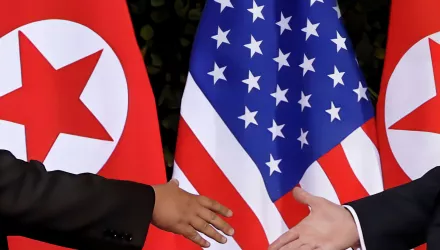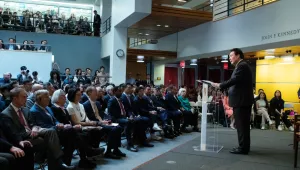
The Belfer Center’s Korea Project convened the inaugural Harvard Korean Security Summit at Harvard Kennedy School in early April. The Summit featured a prominent gathering of Korean security scholars and practitioners and increased attention to the field of Korean security studies within the Harvard community. Built on the vision of the late Ambassador Stephen Bosworth, who first launched Korean security initiatives at the Belfer Center, the event reflected the two traditions that drive the Belfer Center’s work: bringing together leading scholars and senior practitioners to jointly diagnose policy puzzles; and mentoring the next generation of scholars and practitioners.
The Summit, organized by Korea Project Director John Park and his team and supported by the Korea Foundation, took place during a critical inflection point in U.S.-North Korea relations. In the aftermath of President Trump and Chairman Kim’s failed summit in Hanoi, the panelists grappled with a changed security landscape on the Korean Peninsula and debated the way ahead. The Summit opened with a JFK Jr. Forum event focused on the key question, “What is the Path Forward in Negotiating with a Nuclear North Korea?” Belfer Center Co-Director Eric Rosenbach moderated the event with three panelists: former ROK Foreign Minister Yoon Young-kwan, former U.S. Ambassador to ROK Kathleen Stephens, and former U.S. Forces Korea Commander General Vincent Brooks.
Offering advice directly to Chairman Kim, General Brooks said, “In pursuing nuclear weapons and moving Korean Peninsula issues to the center of the international stage, you have put at risk everything you have created.” When asked her thoughts on the Hanoi Summit, Ambassador Stephens said, “Chairman Kim probably went into the summit a little over-confident. It was a big deal for him to be the first DPRK leader to meet a sitting American president.”
The full-day conference kicked off with the “ROK Perspective on U.S.-North Korea Relations.” In his remarks, Foreign Minister Yoon argued that U.S. pressure alone would be insufficient to dismantle the DPRK’s nuclear program and underscored the importance of improving the political relationship with North Korea with concrete actions like establishing a liaison office or declaring the end of the Korean War.
Additional panels focused on questions about the implications of security changes on the Korean Peninsula for the core countries. In a panel led by Ambassador Park In-kook, Patricia Kim, senior policy expert with the U.S. Institute of Peace, observed that Beijing’s primary national interests are to: preserve the Chinese Communist Party’s monopoly over power at home; continue economic growth; and expand global influence, becoming a world-class power by 2049. Professor John Delury of Seoul’s Yonsei University Graduate School of International Studies said Chairman Kim is breaking with his father’s model, and following another model—the developmental dictator—which has far-reaching implications for North Korea and the region.
"First Summit Grapples With Changes in Korean Security Landscape." Belfer Center Newsletter. Belfer Center for Science and International Affairs, Harvard Kennedy School (Summer 2019).


